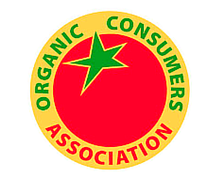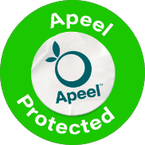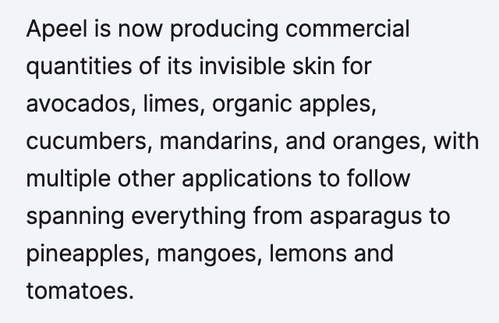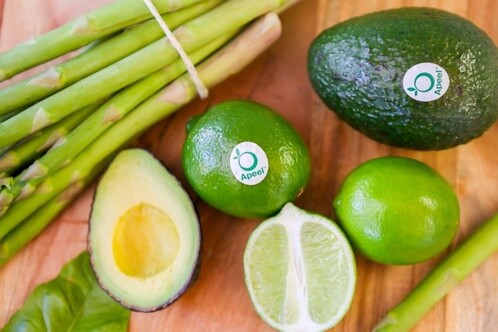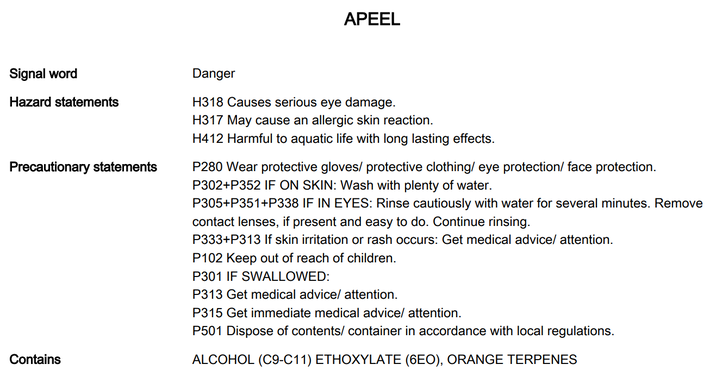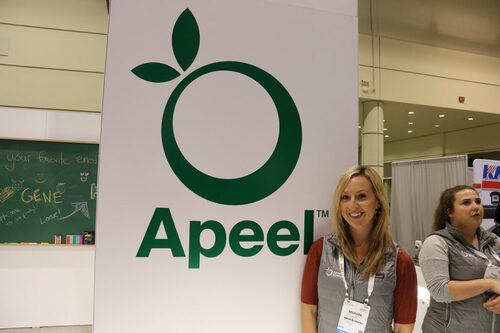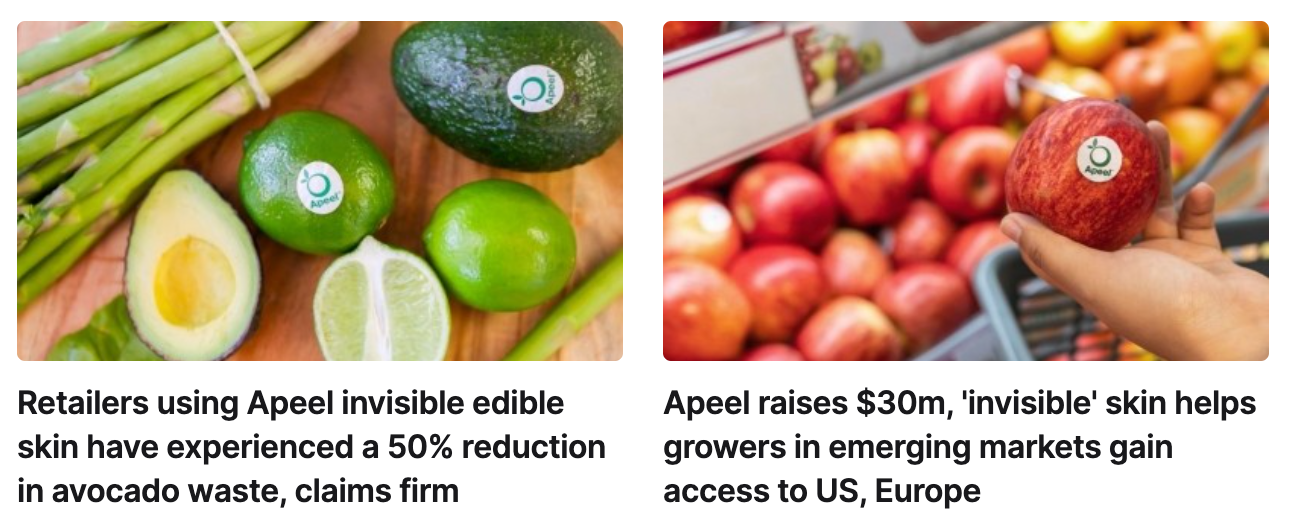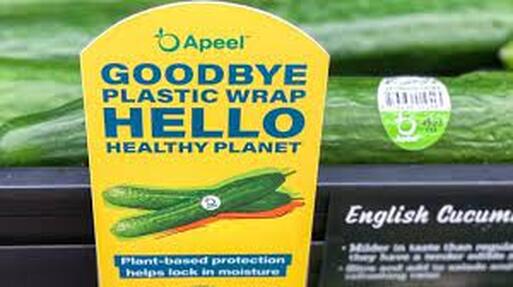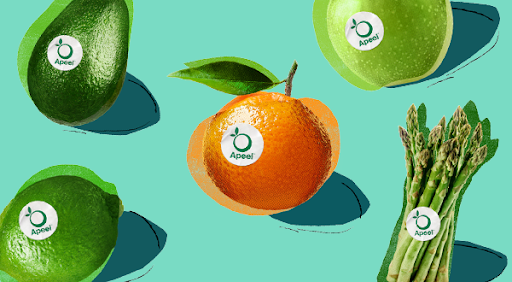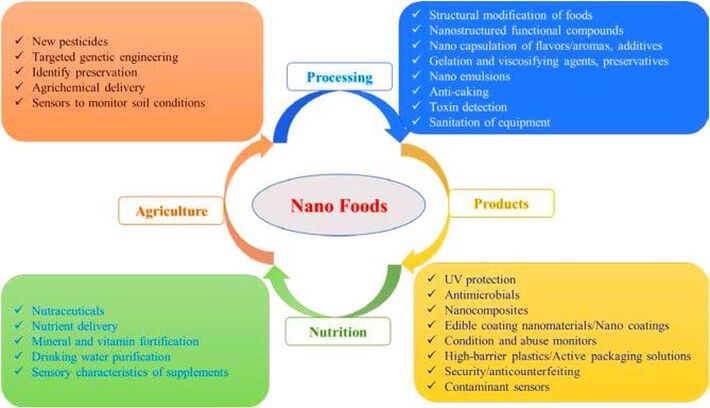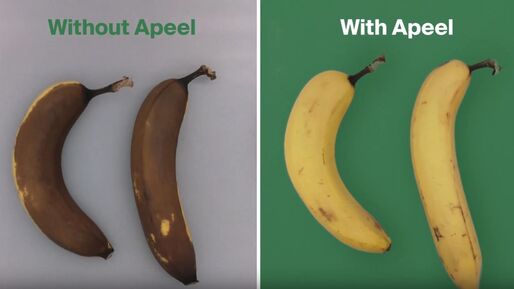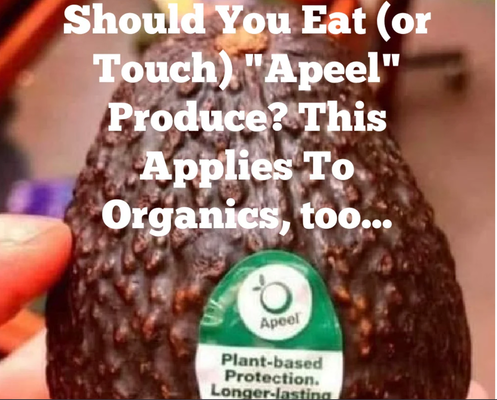🌸
🌸
https://www.youtube.com/@organicconsumer
🌸
Mark Hyman Ridiculously Hyping Apeel
🌸
Dr. Mark Hyman recently accepted money from Apeel Sciences
as his sponsor, pitching their product.
He interviewed the founder of that company,
and someone really needs to address the red herrings
and downright embarrassing arguments the two of them made
as they defended this product sprayed on our food against our will,
which we cannot remove.
🌸
https://www.youtube.com/@organicconsumer
🌸
Mark Hyman Ridiculously Hyping Apeel
🌸
Dr. Mark Hyman recently accepted money from Apeel Sciences
as his sponsor, pitching their product.
He interviewed the founder of that company,
and someone really needs to address the red herrings
and downright embarrassing arguments the two of them made
as they defended this product sprayed on our food against our will,
which we cannot remove.
🌸
Ask the Organic Materials Review Institute … Apeel, a mysterious Bill Gates and World Economic Forum-backed food coating that makes rotting produce appear fresh, is approved for use on USDA Organic produce under the name Organipeel.
The Organic Materials Review Institute (OMRI) gave it the green light, presumably based on citric acid being the active ingredient. Citric acid is a non-organic ingredient allowed in organic as long as it isn’t synthetic, but it’s only 0.66 percent of the Organipeel formulation!
Ask OMRI: What’s in the other 99.44 percent of Organipeel?
At first blush, concerns about Apeel seemed like fake news. Fact checkers were quick to point out that the safety data sheet circulating the internet was for a different product with the same name, not for the edible food coating backed by Bill Gates and the World Economic Forum that was raising hackles on social media.
But, when members of the Organic Consumers Association alerted us to news that Apeel’s is being used in organic, we had to investigate.
How big of a food safety concern is Apeel?
Given everything else Bill Gates and the World Economic Forum expect us to swallow or inject, we can’t be too skeptical, but are the problems with Apeel on the same level as other food safety concerns?
Is it as important to avoid Apeel as it is to reject genetically engineered foods? Toxic pesticides? Factory-farmed animal products laced with livestock drugs, including mRNA vaccines? Indigestible insects? Lab-grown meat-replacements?
Our conclusion is that Apeel carries the same health problems of similar preservatives commonly used to extend the shelf-life of ultra-processed food. On that basis alone, our advice is to avoid Apeel, including the version used on Starr Ranch’s organic apples, known as Organipeel.
We have additional concerns that Apeel is produced using synthetic biology, a new and extreme form of genetic engineering.
The main ingredient in Apeel is monoacylglycerides.
According to Apeel’s GRAS notice submission to the FDA for Edipeel, the industrial process they use to extract monoacylglycerides from grape seed leaves residues of ethyl acetate, heptane, palladium, arsenic, lead, cadmium and mercury.
A European Food Safety Authority review of monoacylglycerides (E 471) notes that “the potential exposure to toxic elements resulting from the consumption of E 471 could be substantial.”
Another EFSA review warns of the possible presence of the carcinogen glycidol in monoacylglycerides.
Monoacylglycerides are among a number of environmental compounds that could be causing diabetes due to their capacity to increase insulin secretion in the absence of high blood sugar. (See “Diabetes: Have We Got It All Wrong?: Insulin hypersecretion and food additives: cause of obesity and diabetes?”)
What’s Apeel doing in organic?
It’s hard to understand how the Organic Materials Review Institute (OMRI) approved Organipeel. According to its EPA registration, Organipeel is 0.66 percent citric acid, a non-organic substance that’s allowed in organic as long as it isn’t synthetic.
Apeel doesn’t disclose what’s in the other 99.44 percent of the product!
Apeel’s patents* claim that, “In some preferred embodiments, the coatings are made from the same chemical feedstocks that are naturally found in the plant cuticle, (e.g., hydroxy and/or dihydroxy palmitic acids, and/or hydroxy or epoxy oleic and stearic acids) and can thus be organic and all-natural.”
It strains credulity to believe that Organipeel could be composed exclusively of ingredients allowed in organic food. If Starr Growers expects organic consumers to eat their Organipeel-coated apples, they should make the entire ingredients list available to consumers.
Is Apeel synbio?
Apeel is frequently listed among the best-funded synbio companies.
In 2018, founder and CEO Dr. James Rogers told FoodNavigator that Apeel would soon use synthetic biology instead of extracting its ingredients from agricultural byproducts.
A 2019 post on the Apeel blog celebrated Jennifer Doudna, the inventor of CRISPR-mediated genome editing:
The world is rightfully excited about CRISPR. This groundbreaking technique not only enables scientists to add or remove genetic material with much greater precision but also much faster and cheaper than any previous method. Moreover, it works efficiently in virtually all cell types and organisms tested. This not only enables molecular biologists to do more complex genetic experiments but also provides a pathway towards true synthetic biology by design.
Doudna has been working for DARPA on “unwanted genome-editing” in other words, the use of CRISPR as a biological weapon.
What’s Apeel’s relationship with the World Economic Forum?
Not only has Apeel been supported by Bill Gates and the World Economic Forum, but founder and CEO Dr. James Rogers is a WEF Young Global Leader.
In April 2020, he wrote an article for the WEF celebrating the COVID lockdowns as good for the environment and a model for future action on climate change.
What’s the appeal of Apeel?
The Weston A. Price Foundation wrote an informative article about Apeel back in 2018, “Is Apeel Appealing?” that concluded:
Do our foods need to be traveling on boats for months at a time before sitting on shelves even longer? And what about the nutritional value of our foods? Will it be affected by Apeel and does that matter to us? Is Apeel’s “second skin” even appealing?
Ultimately, the arrival of Apeel in the marketplace can serve to remind us of the many reasons to eat local, traditional, organic, biodynamic and chemical-free foods.
That’s the most important take-away. Nowhere does anyone claim that Apeel does anything to maintain nutrient density.
Even with refrigeration, every day post-harvest is a loss. Most produce loses 30 percent of nutrients three days after harvest.
Get the best nutrition by eating straight from the garden or farmers’ market. You’ll have no need for Apeel!
*Apeel’s patents:
Plant extract compositions for forming protective coatings
Method for preparing and preserving sanitized products
Agricultural skin grafting
Precursor compounds for molecular coatings
Plant extract compositions and methods of preparation thereof
Compositions formed from plant extracts and methods of preparation thereof
I’m concerned about an OMRI listed product called Organipeel.
Organipeel is a preservative.
According to its manufacturer, Apeel, it “provides reduction of spoilage and decay.”
Coating organic produce with Organipeel is a violation of organic standards, which exclude substances whose primary use is as a preservative.
According to its EPA registration, Organipeel’s active ingredient is citric acid, but that’s only 0.66 percent of the formulation and the other 99.44 percent isn’t disclosed.
How can it be made entirely with allowed substances?
Organipeel is being used to coat apples, which people generally eat without peeling.
Please explain what’s in Organipeel and how OMRI decided to approve it.
The Organic Materials Review Institute (OMRI) gave it the green light, presumably based on citric acid being the active ingredient. Citric acid is a non-organic ingredient allowed in organic as long as it isn’t synthetic, but it’s only 0.66 percent of the Organipeel formulation!
Ask OMRI: What’s in the other 99.44 percent of Organipeel?
At first blush, concerns about Apeel seemed like fake news. Fact checkers were quick to point out that the safety data sheet circulating the internet was for a different product with the same name, not for the edible food coating backed by Bill Gates and the World Economic Forum that was raising hackles on social media.
But, when members of the Organic Consumers Association alerted us to news that Apeel’s is being used in organic, we had to investigate.
How big of a food safety concern is Apeel?
Given everything else Bill Gates and the World Economic Forum expect us to swallow or inject, we can’t be too skeptical, but are the problems with Apeel on the same level as other food safety concerns?
Is it as important to avoid Apeel as it is to reject genetically engineered foods? Toxic pesticides? Factory-farmed animal products laced with livestock drugs, including mRNA vaccines? Indigestible insects? Lab-grown meat-replacements?
Our conclusion is that Apeel carries the same health problems of similar preservatives commonly used to extend the shelf-life of ultra-processed food. On that basis alone, our advice is to avoid Apeel, including the version used on Starr Ranch’s organic apples, known as Organipeel.
We have additional concerns that Apeel is produced using synthetic biology, a new and extreme form of genetic engineering.
The main ingredient in Apeel is monoacylglycerides.
According to Apeel’s GRAS notice submission to the FDA for Edipeel, the industrial process they use to extract monoacylglycerides from grape seed leaves residues of ethyl acetate, heptane, palladium, arsenic, lead, cadmium and mercury.
A European Food Safety Authority review of monoacylglycerides (E 471) notes that “the potential exposure to toxic elements resulting from the consumption of E 471 could be substantial.”
Another EFSA review warns of the possible presence of the carcinogen glycidol in monoacylglycerides.
Monoacylglycerides are among a number of environmental compounds that could be causing diabetes due to their capacity to increase insulin secretion in the absence of high blood sugar. (See “Diabetes: Have We Got It All Wrong?: Insulin hypersecretion and food additives: cause of obesity and diabetes?”)
What’s Apeel doing in organic?
It’s hard to understand how the Organic Materials Review Institute (OMRI) approved Organipeel. According to its EPA registration, Organipeel is 0.66 percent citric acid, a non-organic substance that’s allowed in organic as long as it isn’t synthetic.
Apeel doesn’t disclose what’s in the other 99.44 percent of the product!
Apeel’s patents* claim that, “In some preferred embodiments, the coatings are made from the same chemical feedstocks that are naturally found in the plant cuticle, (e.g., hydroxy and/or dihydroxy palmitic acids, and/or hydroxy or epoxy oleic and stearic acids) and can thus be organic and all-natural.”
It strains credulity to believe that Organipeel could be composed exclusively of ingredients allowed in organic food. If Starr Growers expects organic consumers to eat their Organipeel-coated apples, they should make the entire ingredients list available to consumers.
Is Apeel synbio?
Apeel is frequently listed among the best-funded synbio companies.
In 2018, founder and CEO Dr. James Rogers told FoodNavigator that Apeel would soon use synthetic biology instead of extracting its ingredients from agricultural byproducts.
A 2019 post on the Apeel blog celebrated Jennifer Doudna, the inventor of CRISPR-mediated genome editing:
The world is rightfully excited about CRISPR. This groundbreaking technique not only enables scientists to add or remove genetic material with much greater precision but also much faster and cheaper than any previous method. Moreover, it works efficiently in virtually all cell types and organisms tested. This not only enables molecular biologists to do more complex genetic experiments but also provides a pathway towards true synthetic biology by design.
Doudna has been working for DARPA on “unwanted genome-editing” in other words, the use of CRISPR as a biological weapon.
What’s Apeel’s relationship with the World Economic Forum?
Not only has Apeel been supported by Bill Gates and the World Economic Forum, but founder and CEO Dr. James Rogers is a WEF Young Global Leader.
In April 2020, he wrote an article for the WEF celebrating the COVID lockdowns as good for the environment and a model for future action on climate change.
What’s the appeal of Apeel?
The Weston A. Price Foundation wrote an informative article about Apeel back in 2018, “Is Apeel Appealing?” that concluded:
Do our foods need to be traveling on boats for months at a time before sitting on shelves even longer? And what about the nutritional value of our foods? Will it be affected by Apeel and does that matter to us? Is Apeel’s “second skin” even appealing?
Ultimately, the arrival of Apeel in the marketplace can serve to remind us of the many reasons to eat local, traditional, organic, biodynamic and chemical-free foods.
That’s the most important take-away. Nowhere does anyone claim that Apeel does anything to maintain nutrient density.
Even with refrigeration, every day post-harvest is a loss. Most produce loses 30 percent of nutrients three days after harvest.
Get the best nutrition by eating straight from the garden or farmers’ market. You’ll have no need for Apeel!
*Apeel’s patents:
Plant extract compositions for forming protective coatings
Method for preparing and preserving sanitized products
Agricultural skin grafting
Precursor compounds for molecular coatings
Plant extract compositions and methods of preparation thereof
Compositions formed from plant extracts and methods of preparation thereof
I’m concerned about an OMRI listed product called Organipeel.
Organipeel is a preservative.
According to its manufacturer, Apeel, it “provides reduction of spoilage and decay.”
Coating organic produce with Organipeel is a violation of organic standards, which exclude substances whose primary use is as a preservative.
According to its EPA registration, Organipeel’s active ingredient is citric acid, but that’s only 0.66 percent of the formulation and the other 99.44 percent isn’t disclosed.
How can it be made entirely with allowed substances?
Organipeel is being used to coat apples, which people generally eat without peeling.
Please explain what’s in Organipeel and how OMRI decided to approve it.
🌸
Patty Greer
PURE EVIL WARNING!
Apeel has already secured the following partnerships:
Nature’s Pride (large importer of Europe’s avocados)
Sage Fruit Co. (Washington State organic apple producer)
Del Monte (avocados)
Eco Farms (avocados)
Del Rey (avocados)
Horton Fruit Company (avocados)
RV Aguacates (avocados)
Alpine Fresh (asparagus)
Beta (asparagus)
Farm Direct Supply (asparagus)
La Venta (asparagus)
SiCar Farms (limes)
Many other fruits and vegetables including tomatoes, leafy greens, cucumbers, raspberries,
as well as citrus can use the Edipeel Coating,
with undoubtedly more produce being added in the future.
Apeel’s website even offers a store locator to find where their products are carried near you.
Apeel is (or will be) available at the following grocers:
Costco
Trader Joes
Gelsons
Ralphs
Sprouts
Vons
Walmart
Whole Foods
Kroger
Harps Foods
Wakefern
Price Right
Fairway Market
Target
Bristol Farms and more
LOCAL: It is at Vestal Target on the Avocados!
🌸
Edipeel Coating
https://www.interpack.com/en/Discover/
🌸
Patty Greer
PURE EVIL WARNING!
Apeel has already secured the following partnerships:
Nature’s Pride (large importer of Europe’s avocados)
Sage Fruit Co. (Washington State organic apple producer)
Del Monte (avocados)
Eco Farms (avocados)
Del Rey (avocados)
Horton Fruit Company (avocados)
RV Aguacates (avocados)
Alpine Fresh (asparagus)
Beta (asparagus)
Farm Direct Supply (asparagus)
La Venta (asparagus)
SiCar Farms (limes)
Many other fruits and vegetables including tomatoes, leafy greens, cucumbers, raspberries,
as well as citrus can use the Edipeel Coating,
with undoubtedly more produce being added in the future.
Apeel’s website even offers a store locator to find where their products are carried near you.
Apeel is (or will be) available at the following grocers:
Costco
Trader Joes
Gelsons
Ralphs
Sprouts
Vons
Walmart
Whole Foods
Kroger
Harps Foods
Wakefern
Price Right
Fairway Market
Target
Bristol Farms and more
LOCAL: It is at Vestal Target on the Avocados!
🌸
Edipeel Coating
https://www.interpack.com/en/Discover/
🌸
🌸
Apeel Sciences, based out of California
and partnered with the Bill & Melinda Gates Foundation,
has developed an edible film coating barrier that stops produce from losing moisture,
thereby slowing down visual spoilage.
The tasteless, odorless and colorless edible coating,
meant for both organic and conventional crops,
is procured from already processed or leftover-after-harvest plant-derived materials
such as peels, seeds, pulp and stems from fruits and vegetables.
The company then extracts and processes lipids and glycerolipids
to create the Apeel barriers.
🌸
APEEL is a monoacylglycerides which contain trans fatty acids.
🌸
Safety data sheet says :
APEEL Hazard statements
🌸
H318 Causes serious eye damage.
H317 May cause an allergic skin reaction.
H412 Harmful to aquatic life with long lasting effects.
Precautionary statements ...
P280 Wear protective gloves/ protective clothing/ eye protection/ face protection.
P302+P352 IF ON SKIN: Wash with plenty of water. ETC. ...
🌸
https://articles.mercola.com/sites/articles/archive/2023/05/10/apeel-synthetic-fruit-coating.aspx?
🌸
Apeel Sciences, based out of California
and partnered with the Bill & Melinda Gates Foundation,
has developed an edible film coating barrier that stops produce from losing moisture,
thereby slowing down visual spoilage.
The tasteless, odorless and colorless edible coating,
meant for both organic and conventional crops,
is procured from already processed or leftover-after-harvest plant-derived materials
such as peels, seeds, pulp and stems from fruits and vegetables.
The company then extracts and processes lipids and glycerolipids
to create the Apeel barriers.
🌸
APEEL is a monoacylglycerides which contain trans fatty acids.
🌸
Safety data sheet says :
APEEL Hazard statements
🌸
H318 Causes serious eye damage.
H317 May cause an allergic skin reaction.
H412 Harmful to aquatic life with long lasting effects.
Precautionary statements ...
P280 Wear protective gloves/ protective clothing/ eye protection/ face protection.
P302+P352 IF ON SKIN: Wash with plenty of water. ETC. ...
🌸
https://articles.mercola.com/sites/articles/archive/2023/05/10/apeel-synthetic-fruit-coating.aspx?
🌸
| United States Edipeel Product Information Sheet .pdf | |
| File Size: | 670 kb |
| File Type: | |
🌸
Apeel avocados expected at every U.S. grocery
store within a year
October 24 , 2018
🌸
https://www.freshfruitportal.com/news/2018/10/24/
🌸
Apeel avocados expected at every U.S. grocery
store within a year
October 24 , 2018
🌸
https://www.freshfruitportal.com/news/2018/10/24/
🌸
| Apeel.pdf | |
| File Size: | 249 kb |
| File Type: | |
🌸
🌸
Don't eat anything
with the "APEEL" sticker on it.
🌸
Don't eat anything
with the "APEEL" sticker on it.
🌸
CAUTION: "Don't eat anything with the "APEEL" sticker on it.
UK Asda selling Gates/WEF backed toxic foods. GMO mentioned also?
Gates is partner, they have GRAS designation, marketed as preservative, pesticide and fungicide, Costco & Kroger are buying produce coated with it, "polymer" means it's a plastic, Oprah and Katy Perry are invested in it (another reason to be suspicious).
I notice avocados strangely look good on the outside, but you cut into them and they're rotten on the inside, maybe just one end, maybe all over. from Apeel website: Apeel is made from edible plant oils and composed entirely of mono and diglycerides.
Looks like it's only used on grapefruit in Europe
https://www.westonaprice.org/health-topics/is-apeel-appealing/#gsc.tab=0
https://www.cnbc.com/2020/06/18/oprah-and-katy-perry-invest-in-apeel-to-solve-the-us-food
https://www.apeel.com
Detergent?
Persistence and degradability.
The surfactant(s) contained in this product complies(comply) with the biodegradability criteria as laid down in The Detergents Regulations (as amended). and UK Regulation: SI 2020 No.
1617 "The Detergents (Amendment) (EU Exit) Regulations 2020".
Also:
"Safety data sheet says : APEEL Hazard statements H318 Causes serious eye damage. H317 May cause an allergic skin reaction. H412 Harmful to aquatic life with long lasting effects.
Precautionary statements P280 Wear protective gloves/ protective clothing/ eye protection/ face protection. P302+P352 IF ON SKIN: Wash with plenty of
water."
https://www.evansvanodine.co.uk/assets/eng_apeel.pdf
Don't eat anything with the "Apeel" sticker on it.
It just appeared in our grocery stores saw it for the first time today. The cucumbers not wraped in plastic but there's a big sign says coated in Apeel to protect freshness and reduced plastic waste. The cucumbers also have a sticker on them with the word Apeel.
I checked the company out its funded by Bill Gates and others and the WEF indorses it.
And I checked there website out you can't find any info about what exactly is apeel.
Look at the frequently asked questions.
They even tell you there don't buy it if your worried.
In Canada so far it's just on cucumbers and maybe apples. In the US it's avocados,
apples and I think limes and lemons maybe cucumbers too.
The company is very mysterious about what the product actually is. And it can't be washed off no mater how much scrubbing it even says this on the website in the FAQ. Supposedly it can make produce last up to 3 times longer.
Also suddenly the price of cucumbers dropped today to just over $3 for 3 cucumbers in a pack or $1.27 a cucumber they really want people to buy these cucumbers."
Safety data sheet says : APEEL Hazard statements
H318 Causes serious eye damage.
H317 May cause an allergic skin reaction.
H412 Harmful to aquatic life with long lasting effects. Precautionary statements
P280 Wear protective gloves/ protective clothing/ eye protection/ face protection.
P302+P352 IF ON SKIN: Wash with plenty of water.
https://www.evansvanodine.co.uk/assets/eng_apeel.pdf
Some more info ...
https://www.foodnavigator.com/Article/2022/02/25/Apeel-rolls-out-in-Asda-to-extend-shelf-life-It-works-by-sealing-moisture-in-and-keeping-oxygen-out
APEEL is a monoacylglycerides which contain trans fatty acids.
Why do we continue to adulterate our food!
https://www.apeel.com
https://www.westonaprice.org/health-topics/is-apeel-appealing/#gsc.tab=0
UK Asda selling Gates/WEF backed toxic foods. GMO mentioned also?
Gates is partner, they have GRAS designation, marketed as preservative, pesticide and fungicide, Costco & Kroger are buying produce coated with it, "polymer" means it's a plastic, Oprah and Katy Perry are invested in it (another reason to be suspicious).
I notice avocados strangely look good on the outside, but you cut into them and they're rotten on the inside, maybe just one end, maybe all over. from Apeel website: Apeel is made from edible plant oils and composed entirely of mono and diglycerides.
Looks like it's only used on grapefruit in Europe
https://www.westonaprice.org/health-topics/is-apeel-appealing/#gsc.tab=0
https://www.cnbc.com/2020/06/18/oprah-and-katy-perry-invest-in-apeel-to-solve-the-us-food
https://www.apeel.com
Detergent?
Persistence and degradability.
The surfactant(s) contained in this product complies(comply) with the biodegradability criteria as laid down in The Detergents Regulations (as amended). and UK Regulation: SI 2020 No.
1617 "The Detergents (Amendment) (EU Exit) Regulations 2020".
Also:
"Safety data sheet says : APEEL Hazard statements H318 Causes serious eye damage. H317 May cause an allergic skin reaction. H412 Harmful to aquatic life with long lasting effects.
Precautionary statements P280 Wear protective gloves/ protective clothing/ eye protection/ face protection. P302+P352 IF ON SKIN: Wash with plenty of
water."
https://www.evansvanodine.co.uk/assets/eng_apeel.pdf
Don't eat anything with the "Apeel" sticker on it.
It just appeared in our grocery stores saw it for the first time today. The cucumbers not wraped in plastic but there's a big sign says coated in Apeel to protect freshness and reduced plastic waste. The cucumbers also have a sticker on them with the word Apeel.
I checked the company out its funded by Bill Gates and others and the WEF indorses it.
And I checked there website out you can't find any info about what exactly is apeel.
Look at the frequently asked questions.
They even tell you there don't buy it if your worried.
In Canada so far it's just on cucumbers and maybe apples. In the US it's avocados,
apples and I think limes and lemons maybe cucumbers too.
The company is very mysterious about what the product actually is. And it can't be washed off no mater how much scrubbing it even says this on the website in the FAQ. Supposedly it can make produce last up to 3 times longer.
Also suddenly the price of cucumbers dropped today to just over $3 for 3 cucumbers in a pack or $1.27 a cucumber they really want people to buy these cucumbers."
Safety data sheet says : APEEL Hazard statements
H318 Causes serious eye damage.
H317 May cause an allergic skin reaction.
H412 Harmful to aquatic life with long lasting effects. Precautionary statements
P280 Wear protective gloves/ protective clothing/ eye protection/ face protection.
P302+P352 IF ON SKIN: Wash with plenty of water.
https://www.evansvanodine.co.uk/assets/eng_apeel.pdf
Some more info ...
https://www.foodnavigator.com/Article/2022/02/25/Apeel-rolls-out-in-Asda-to-extend-shelf-life-It-works-by-sealing-moisture-in-and-keeping-oxygen-out
APEEL is a monoacylglycerides which contain trans fatty acids.
Why do we continue to adulterate our food!
https://www.apeel.com
https://www.westonaprice.org/health-topics/is-apeel-appealing/#gsc.tab=0
🌸
🌸
Is Apeel Appealing ?
OCTOBER 27, 2018
https://www.westonaprice.org/health-topics/is-apeel-appealing/#gsc.tab=0
🌸
Is Apeel Appealing ?
OCTOBER 27, 2018
https://www.westonaprice.org/health-topics/is-apeel-appealing/#gsc.tab=0
🌸
Instead of local organic produce, imagine your organic fruits and vegetables traveling the world by slow boat and then still looking fresh for an extended time on retail shelves. What could make it possible for fruits and vegetables to double their lifespan at retail or make them transportable for longer times over longer distances even without refrigeration?
Apeel Sciences, based out of California and partnered with the Bill & Melinda Gates Foundation, has developed an edible film coating barrier that stops produce from losing moisture, thereby slowing down visual spoilage.
The tasteless, odorless and colorless edible coating, meant for both organic and conventional crops, is procured from already processed or leftover-after-harvest plant-derived materials such as peels, seeds, pulp and stems from fruits and vegetables. The company then extracts and processes lipids and glycerolipids to create the Apeel barriers.
PRODUCTS AND LAUNCH
Apeel Sciences currently offers two different products for application to crops at various points in the growing and harvesting cycle. The first product, Invisipeel, can be applied by growers to crops in the field. Second, growers can apply Edipeel after harvest. With Edipeel, the growers wait until crops are ripe before harvesting them and then place them on conveyor belts to spray or simply dip them into the Apeel solution, which solidifies around the fruit or vegetable, forming a barrier.
Edipeel already has approval from the U.S. Food and Drug Administration (FDA) as “generally recognized as safe” (GRAS). The two products will be marketed as preserving agents (keeping the outward appearance of freshness of the fruit or vegetable), as pesticides (creating a physical barrier for pests) or even as fungicides (such as preventing the anthracnose fungus from shriveling up avocados).1-3
Apeel Sciences launched commercially in 2018 and is looking for market food growers to use its products. Having already conducted successful trials in Africa on cassava roots, which decay rapidly after harvest, the small company is looking to grow, beginning with shipped imports that will slowly transport Apeel-coated crops intended for sale at local conventional and organic markets. The Apeel label will soon appear on U.S. produce.
MANY QUESTIONS
Notwithstanding the procurement of FDA approval, there is a possibility that Apeel’s products and ingredients will meet with controversy in some sectors. In fact, the products raise many questions about health, nutrient density, farm costs, ease of application and workflow.
For example, which chemicals does the company use to extract the lipids and glycerolipids from leftover plant-derived materials? From where does the company obtain the leftover, already-processed plant materials that it uses, and what is the quality of these plant materials?
Which chemicals may have already been used on the plant materials themselves that would then be present in Apeel solutions intended for use on organic foods? What is the solidification process? Will the materials always come from the same sources (and from only organic materials), or will the source materials change over time?
Concerning the question of whether all the ingredients intended for organic crops are themselves organic, The New York Times reported in late 2016 that, “So far, the products are derived primarily from the remains of produce that has been certified organic, like grape skins left over from wine production and stems left behind after broccoli is harvested” [emphasis added]—but “primarily” does not mean one hundred percent organic.
Organic labeling standards allow a box or container of food to state that it is “made with organic ingredients” if it contains just 70 percent organically produced ingredients.4
An additional question is whether consumers in a traditional organic market will even want the Apeel film coating on their produce. In other words, does Apeel have a place in the organic marketplace?
Informed consumers have long understood that the best way of getting high-nutrient-density fruits and vegetables is to consume in-season produce that is locally grown and organic or biodynamic. This allows them to inspect their produce visually and use appearance as a proxy indicator for gauging freshness and nutrient density.
Because Apeel’s barrier coating halts the visual decay of fruits and vegetables (an otherwise natural post-harvest occurrence), it will prevent consumers from knowing how long ago the produce was harvested and, therefore, will make it difficult to make inferences about nutrient density. It also may prove more difficult to ascertain where Apeel-coated produce comes from. The net result is that the customer may be faced with more foods of uncertain nutritional quality that have traveled long distances.
AND MORE QUESTIONS
Apeel Sciences’ products present a range of economic, international and regulatory concerns. Consider the Codex Alimentarius international food standards and the other international regulations that control world food markets. Food already travels around the world via Codex.
For example, chickens are shipped to China for bleaching and then come back to the U.S. marketplace for sale.5 What will happen to apple growers in the U.S. when Apeel-coated apples start pouring in from China? Far-away economies may get a boost from Apeel, but local farmers risk going out of business while consumers are left with less nutritious and lower-quality foods.
Consumers may wish to ask themselves some hard questions about Apeel and similar technologies, including whether the products represent an attempt to move U.S. consumers away from local organic foods. Do Apeel products belong on organic and biodynamic foods?
Do we want to take the risk of finding out? Do our foods need to be traveling on boats for months at a time before sitting on shelves even longer? And what about the nutritional value of our foods? Will it be affected by Apeel and does that matter to us? Is Apeel’s “second skin” even appealing?
Ultimately, the arrival of Apeel in the marketplace can serve to remind us of the many reasons to eat local, traditional, organic, biodynamic and chemical-free foods. It is important to keep asking questions about the foods we eat, and to let Weston A. Price Foundation (WAPF) chapter leaders, food club coordinators, farmers, grocery stores, food markets, friends and family know that we do not want more chemical applications on food.
Fortunately, the WAPF Shopping Guide lists companies and farms that prioritize the highest-quality and most nutrient-dense foods. As they say, let’s vote with our dollars.
REFERENCES
1. Garfield L. Spray this invisible, edible coating on produce and it will last five times longer. Business Insider, Jan. 16, 2017.
2. Dewey C. This start-up can make avocados last twice as long before going bad. Los Angeles Times, June 19, 2018.
3. Strom S. An (edible) solution to extend produce’s shelf life. The New York Times, Dec. 13, 2016.
4. “Organic labeling standards.” https://www.ams.usda.gov/grades-standards/organic-labelingstandards.
5. McKenna M. USDA: chicken processed in China can be sold in the US without labels to say so. Wired, Sept. 4, 2013.
This article appeared in Wise Traditions in Food, Farming and the Healing Arts, the quarterly magazine of the Weston A. Price Foundation, Fall 2018.
https://www.theatlantic.com/technology/archive/2017/04/why-fruit-has-a-fake-wax-coating/524619/
Apeel Sciences, based out of California and partnered with the Bill & Melinda Gates Foundation, has developed an edible film coating barrier that stops produce from losing moisture, thereby slowing down visual spoilage.
The tasteless, odorless and colorless edible coating, meant for both organic and conventional crops, is procured from already processed or leftover-after-harvest plant-derived materials such as peels, seeds, pulp and stems from fruits and vegetables. The company then extracts and processes lipids and glycerolipids to create the Apeel barriers.
PRODUCTS AND LAUNCH
Apeel Sciences currently offers two different products for application to crops at various points in the growing and harvesting cycle. The first product, Invisipeel, can be applied by growers to crops in the field. Second, growers can apply Edipeel after harvest. With Edipeel, the growers wait until crops are ripe before harvesting them and then place them on conveyor belts to spray or simply dip them into the Apeel solution, which solidifies around the fruit or vegetable, forming a barrier.
Edipeel already has approval from the U.S. Food and Drug Administration (FDA) as “generally recognized as safe” (GRAS). The two products will be marketed as preserving agents (keeping the outward appearance of freshness of the fruit or vegetable), as pesticides (creating a physical barrier for pests) or even as fungicides (such as preventing the anthracnose fungus from shriveling up avocados).1-3
Apeel Sciences launched commercially in 2018 and is looking for market food growers to use its products. Having already conducted successful trials in Africa on cassava roots, which decay rapidly after harvest, the small company is looking to grow, beginning with shipped imports that will slowly transport Apeel-coated crops intended for sale at local conventional and organic markets. The Apeel label will soon appear on U.S. produce.
MANY QUESTIONS
Notwithstanding the procurement of FDA approval, there is a possibility that Apeel’s products and ingredients will meet with controversy in some sectors. In fact, the products raise many questions about health, nutrient density, farm costs, ease of application and workflow.
For example, which chemicals does the company use to extract the lipids and glycerolipids from leftover plant-derived materials? From where does the company obtain the leftover, already-processed plant materials that it uses, and what is the quality of these plant materials?
Which chemicals may have already been used on the plant materials themselves that would then be present in Apeel solutions intended for use on organic foods? What is the solidification process? Will the materials always come from the same sources (and from only organic materials), or will the source materials change over time?
Concerning the question of whether all the ingredients intended for organic crops are themselves organic, The New York Times reported in late 2016 that, “So far, the products are derived primarily from the remains of produce that has been certified organic, like grape skins left over from wine production and stems left behind after broccoli is harvested” [emphasis added]—but “primarily” does not mean one hundred percent organic.
Organic labeling standards allow a box or container of food to state that it is “made with organic ingredients” if it contains just 70 percent organically produced ingredients.4
An additional question is whether consumers in a traditional organic market will even want the Apeel film coating on their produce. In other words, does Apeel have a place in the organic marketplace?
Informed consumers have long understood that the best way of getting high-nutrient-density fruits and vegetables is to consume in-season produce that is locally grown and organic or biodynamic. This allows them to inspect their produce visually and use appearance as a proxy indicator for gauging freshness and nutrient density.
Because Apeel’s barrier coating halts the visual decay of fruits and vegetables (an otherwise natural post-harvest occurrence), it will prevent consumers from knowing how long ago the produce was harvested and, therefore, will make it difficult to make inferences about nutrient density. It also may prove more difficult to ascertain where Apeel-coated produce comes from. The net result is that the customer may be faced with more foods of uncertain nutritional quality that have traveled long distances.
AND MORE QUESTIONS
Apeel Sciences’ products present a range of economic, international and regulatory concerns. Consider the Codex Alimentarius international food standards and the other international regulations that control world food markets. Food already travels around the world via Codex.
For example, chickens are shipped to China for bleaching and then come back to the U.S. marketplace for sale.5 What will happen to apple growers in the U.S. when Apeel-coated apples start pouring in from China? Far-away economies may get a boost from Apeel, but local farmers risk going out of business while consumers are left with less nutritious and lower-quality foods.
Consumers may wish to ask themselves some hard questions about Apeel and similar technologies, including whether the products represent an attempt to move U.S. consumers away from local organic foods. Do Apeel products belong on organic and biodynamic foods?
Do we want to take the risk of finding out? Do our foods need to be traveling on boats for months at a time before sitting on shelves even longer? And what about the nutritional value of our foods? Will it be affected by Apeel and does that matter to us? Is Apeel’s “second skin” even appealing?
Ultimately, the arrival of Apeel in the marketplace can serve to remind us of the many reasons to eat local, traditional, organic, biodynamic and chemical-free foods. It is important to keep asking questions about the foods we eat, and to let Weston A. Price Foundation (WAPF) chapter leaders, food club coordinators, farmers, grocery stores, food markets, friends and family know that we do not want more chemical applications on food.
Fortunately, the WAPF Shopping Guide lists companies and farms that prioritize the highest-quality and most nutrient-dense foods. As they say, let’s vote with our dollars.
REFERENCES
1. Garfield L. Spray this invisible, edible coating on produce and it will last five times longer. Business Insider, Jan. 16, 2017.
2. Dewey C. This start-up can make avocados last twice as long before going bad. Los Angeles Times, June 19, 2018.
3. Strom S. An (edible) solution to extend produce’s shelf life. The New York Times, Dec. 13, 2016.
4. “Organic labeling standards.” https://www.ams.usda.gov/grades-standards/organic-labelingstandards.
5. McKenna M. USDA: chicken processed in China can be sold in the US without labels to say so. Wired, Sept. 4, 2013.
This article appeared in Wise Traditions in Food, Farming and the Healing Arts, the quarterly magazine of the Weston A. Price Foundation, Fall 2018.
https://www.theatlantic.com/technology/archive/2017/04/why-fruit-has-a-fake-wax-coating/524619/
🌸
🌸
🌸
https://www.foodnavigator.com/Article/2021/04/10/Retailers-using-Apeel-invisible-edible-skin-have-experienced-a-50-reduction-in-avocado-waste-claims-firm
https://www.foodnavigator.com/Article/2020/10/27/Apeel-raises-30m-invisible-skin-helps-growers-in-emerging-markets-gain-access-to-US-Europe
🌸
https://www.foodnavigator.com/Article/2021/04/10/Retailers-using-Apeel-invisible-edible-skin-have-experienced-a-50-reduction-in-avocado-waste-claims-firm
https://www.foodnavigator.com/Article/2020/10/27/Apeel-raises-30m-invisible-skin-helps-growers-in-emerging-markets-gain-access-to-US-Europe
🌸
🌸
🌸
🌸
Application of nanotechnology in food:
processing, preservation,
packaging and safety assessment
🌸
https://www.sciencedirect.com/science/article/pii/S2405844022030833
🌸
Download : Download high-res image (708KB)Download :
Download full-size image
🌸
Application of nanotechnology in food:
processing, preservation,
packaging and safety assessment
🌸
https://www.sciencedirect.com/science/article/pii/S2405844022030833
🌸
Download : Download high-res image (708KB)Download :
Download full-size image
🌸
🌸
Don’t Eat or Touch “Apeel” Produce!
This Applies To Organics, too.
By Jacqueline
🌸
https://deeprootsathome.com/dont-touch-apeel-produce-this-applies-to-organics-too/
🌸
Don’t Eat or Touch “Apeel” Produce!
This Applies To Organics, too.
By Jacqueline
🌸
https://deeprootsathome.com/dont-touch-apeel-produce-this-applies-to-organics-too/
🌸
I am disgusted about the new invisible spray-on coating for fruit and veggies called “Apeel”. I’m appalled because so many have already fallen hook, line, and sinker for this new way to contaminate our God-given food, making it less and less likely that we will be able to purchase and eat truly FRESH food in the future.
B. Gates, Katy Perry, and Oprah are 3 powerful names that have stakes in the ESG-compliant Apeel company. The new mega-corporations will just continue to tinker with products that will end up in our bodies one way or another. Whether it be medicine we swallow or inject or food we ingest. All while claiming it’s for the greater good.
U.S. companies like Kroger are joining the chorus promoting Apeel in the name of eliminating “food waste”. Apeel has a presence in 8 countries, operating 30 supply networks and distributing produce to 40 retail partners, which then goes out to tens of thousands of stores around the world. (source)
Right now selected stores that are participating carry mainly avocados and cucumbers coated in the invisible spray, but the company says they have also developed ‘solutions’ for limes, mandarins, apples and oranges. (source) Other applications to follow include “everything from asparagus to pineapples, mangoes, lemons and tomatoes”. (source)
And if you think by choosing organic you’re good to go… think again. On their website they state, “We have formulations that are OMRI Listed® for the growers and distributors of USDA Certified Organic produce.” (Apeel FAQs)
Apeel spray can’t be washed off no matter how much scrubbing — also according to the FAQs.
In an Instagram video reel, before it was taken down, you could hear Jenny Du, one of Apeel’s co-founders, say we are all made of “star stuff” and “Everything we eat is chemical!” in a clear attempt to convince you that coating your food in mystery chemicals is somehow normal and okay.
Obviously she doesn’t understand Stoichiometry.
Because ‘the elements around us’, the chemicals… depending on how they combine with other chemicals… can be quite… TOXIC.
Apeel’s site is vague but states the ingredients are glycerolipids, “specifically the food additive mono- and diglycerides of fatty acids”.
Buyer Beware: Mono- and diglycerides contain trans-fat, which promotes inflammation in the body and has been associated with heart disease, diabetes, stroke, and obesity.
FoodBabe exposes how the FDA finally recognized the dangers of trans-fat and began requiring manufacturers to list trans-fat on food labels.
And a strong caveat: a Safety Data Sheet (SDS) that I have seen circulating on social media for ‘Apeel’ (this may NOT be for the ‘Apeel’ for produce discussed above!)
Lists the Ingredients for you to research yourself to come to your own conclusions: https://www.evansvanodine.co.uk/assets/eng_apeel.pdf?
SDS Section 3 lists Composition/Information on Ingredients:
Over time, what might this do to the gut microbiome and all the implications of that? Do we want to find out?
Bottom-line? I recommend till we know more, don’t even touch it and keep doing your research.
There is no healthful purpose to this. It appears purely to boost profits for the companies who supply produce.
Ultimately, the reality of Apeel in the marketplace can serve to remind us of the many reasons to eat local, traditional, organic, biodynamic and chemical-free foods. And, if there was ever a time to garden, now is it!
“Do not be anxious about anything, but in every situation, by prayer and petition, with thanksgiving, present your requests to God. And the peace of God, which transcends all understanding, will guard your hearts and your minds in Christ Jesus.” ~Philippians 4:6-7
“Even if I knew that tomorrow the world would go to pieces, I would still plant my apple tree.” ~Martin Luther
*** For the Full Spike Protein Protocol (including NAC) to protect from transmission from the “V” and to help those who took the “V”, go here.
Deep Roots At Home now has a PODCAST!
We are covering everything from vaccines, parenting topics, alternative medicine. Head over today and like, share and download a few episodes! https://buff.ly/3KmTZZd
If you want to stay connected, here is one way…
B. Gates, Katy Perry, and Oprah are 3 powerful names that have stakes in the ESG-compliant Apeel company. The new mega-corporations will just continue to tinker with products that will end up in our bodies one way or another. Whether it be medicine we swallow or inject or food we ingest. All while claiming it’s for the greater good.
U.S. companies like Kroger are joining the chorus promoting Apeel in the name of eliminating “food waste”. Apeel has a presence in 8 countries, operating 30 supply networks and distributing produce to 40 retail partners, which then goes out to tens of thousands of stores around the world. (source)
Right now selected stores that are participating carry mainly avocados and cucumbers coated in the invisible spray, but the company says they have also developed ‘solutions’ for limes, mandarins, apples and oranges. (source) Other applications to follow include “everything from asparagus to pineapples, mangoes, lemons and tomatoes”. (source)
And if you think by choosing organic you’re good to go… think again. On their website they state, “We have formulations that are OMRI Listed® for the growers and distributors of USDA Certified Organic produce.” (Apeel FAQs)
Apeel spray can’t be washed off no matter how much scrubbing — also according to the FAQs.
In an Instagram video reel, before it was taken down, you could hear Jenny Du, one of Apeel’s co-founders, say we are all made of “star stuff” and “Everything we eat is chemical!” in a clear attempt to convince you that coating your food in mystery chemicals is somehow normal and okay.
Obviously she doesn’t understand Stoichiometry.
Because ‘the elements around us’, the chemicals… depending on how they combine with other chemicals… can be quite… TOXIC.
Apeel’s site is vague but states the ingredients are glycerolipids, “specifically the food additive mono- and diglycerides of fatty acids”.
Buyer Beware: Mono- and diglycerides contain trans-fat, which promotes inflammation in the body and has been associated with heart disease, diabetes, stroke, and obesity.
FoodBabe exposes how the FDA finally recognized the dangers of trans-fat and began requiring manufacturers to list trans-fat on food labels.
And a strong caveat: a Safety Data Sheet (SDS) that I have seen circulating on social media for ‘Apeel’ (this may NOT be for the ‘Apeel’ for produce discussed above!)
Lists the Ingredients for you to research yourself to come to your own conclusions: https://www.evansvanodine.co.uk/assets/eng_apeel.pdf?
SDS Section 3 lists Composition/Information on Ingredients:
- ALCOHOL (C9-C11) ETHOXYLATE (6EO) (Class: Acute Toxicity 4 and Eye Damage 1)
- ORANGE TERPENES (Class: Skin Irritant 2; Skin Sensitivity 1; Aquatic Harm Chronic 2)
- SODIUM (C12-14) ALKYL ETHOXY SULPHATE (Class: Skin Irritant 2; Eye Damage 1; Aquatic Harm Chronic 3)
- 1,2-BENZISOTHIAZOLIN-3-ONE [BIT] (Class: Acute Toxicity 4; Skin Irritant 2; Eye Damage 1; Skin Sens. 1; Aquatic Harm Acute 1; Aquatic Harm Chronic 2)
Over time, what might this do to the gut microbiome and all the implications of that? Do we want to find out?
Bottom-line? I recommend till we know more, don’t even touch it and keep doing your research.
There is no healthful purpose to this. It appears purely to boost profits for the companies who supply produce.
Ultimately, the reality of Apeel in the marketplace can serve to remind us of the many reasons to eat local, traditional, organic, biodynamic and chemical-free foods. And, if there was ever a time to garden, now is it!
“Do not be anxious about anything, but in every situation, by prayer and petition, with thanksgiving, present your requests to God. And the peace of God, which transcends all understanding, will guard your hearts and your minds in Christ Jesus.” ~Philippians 4:6-7
“Even if I knew that tomorrow the world would go to pieces, I would still plant my apple tree.” ~Martin Luther
*** For the Full Spike Protein Protocol (including NAC) to protect from transmission from the “V” and to help those who took the “V”, go here.
Deep Roots At Home now has a PODCAST!
We are covering everything from vaccines, parenting topics, alternative medicine. Head over today and like, share and download a few episodes! https://buff.ly/3KmTZZd
If you want to stay connected, here is one way…
🌸
🌸
🌸
https://www.youtube.com/@greensmoothiegirl
🌸
Mark Hyman Ridiculously Hyping Apeel
🌸
Dr. Mark Hyman recently accepted money from Apeel Sciences
as his sponsor, pitching their product.
He interviewed the founder of that company,
and someone really needs to address the red herrings
and downright embarrassing arguments the two of them made
as they defended this product sprayed on our food against our will,
which we cannot remove.
www.youtube.com
🌸
https://www.youtube.com/@greensmoothiegirl
🌸
Mark Hyman Ridiculously Hyping Apeel
🌸
Dr. Mark Hyman recently accepted money from Apeel Sciences
as his sponsor, pitching their product.
He interviewed the founder of that company,
and someone really needs to address the red herrings
and downright embarrassing arguments the two of them made
as they defended this product sprayed on our food against our will,
which we cannot remove.
www.youtube.com
🌸

